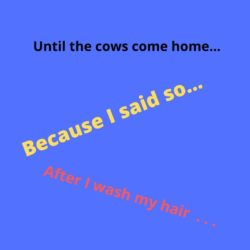 When we think about conjunctions (and who even does that!), we think about connecting words such as the FANBOYS conjunctions (for, and, nor, but, or, yet, so) that we talked about last week. However, there is another category of conjunctions: subordinating.
When we think about conjunctions (and who even does that!), we think about connecting words such as the FANBOYS conjunctions (for, and, nor, but, or, yet, so) that we talked about last week. However, there is another category of conjunctions: subordinating.
Subordinating conjunctions begin subordinate clauses. Here are some examples of subordinate clauses. The subordinating conjunction is in italics:
- although I am going on vacation
- because I am working late
- until the cows come home
- whenever I hear that song
- before the play starts
- since he moved away
- after I get home
You know that these are clauses (not phrases) because there is a subject and a verb in the words that follow each of these conjunctions. When you put one of these clauses (which cannot stand on their own) with an independent clause (sentence), you have a complex sentence:
- Although I am going on vacation, I will be working through Wednesday.
- I will miss dinner because I am working late.
- I will be practicing the same piano piece until the cows come home!
- Whenever I hear that song, I think about my brother.
- I am getting some food before the play starts.
- Since he moved away, the neighborhood is very quiet.
- We can watch television after I get home.
Because they are connecting words, coordinating conjunctions are generally between words, phrases, or sentences:
- Ted and Sally
- to the movies and to the park
- I am reading my book, and I am eating dinner.
Coordinating conjunctions don’t begin sentences (well, we said sometimes you can start a sentence with one, but in that case they are generally connecting your sentence with the sentence before it).
As you see by the examples, subordinating conjunctions can begin sentences, or they can be in the middle. When they appear in the middle of a sentence, they look as if they are connecting two clauses, but they aren’t. They belong to one of the clauses:
I will miss dinner because I am working late.
You can tell that because is not connecting two sentences because if you flip them around, the meaning changes:
I am working late because I will miss dinner.
Because clearly belongs to I am working late.
However, you can always flip the clauses around and the sentence still makes sense. And the subordinating conjunction always stays with its clause. Here are the examples above switched around.
- I will be working through Wednesday, although I am going on vacation.
- Because I am working late, I will miss dinner.
- Until the cows come home, I will be practicing the same piano piece.
- I think about my brother whenever I hear that song.
- Before the play starts, I am getting some food.
- The neighborhood is very quiet since he moved away.
- After I get home, we can watch television.
Now, look at the punctuation. Whenever the subordinate conjunction begins the sentence (like this one), there is a comma after the clause (because it is introductory material). However, when the subordinate clause comes at the end of the sentence, there is usually no comma because the clause is necessary to these sentences. The exception is although, which usually introduces added information (as in the first example, where I would say the comma is optional).
Sometimes these conjunctions are not conjunctions at all, but prepositions. Do you care? Probably not. However, you can tell by what comes after them. If just an article and a noun follow, the word is being used as a preposition. If a subject and verb follow, it is a subordinating conjunction beginning a clause.
- after the game (preposition)/ after the game is over (subordinating conjunction)
- until dinner/ until I finish dinner
- before bedtime/ before I go to bed
Teachers many times tell young students (incorrectly, but for their own good at the time) not to begin sentences with because. Why? Many times students write the subordinate clause without adding the independent clause, and they wind up with a sentence fragment: Because I stayed home. Obviously, it is fine to begin a sentence with because or any other subordinating conjunction — as long as you finish the sentence.
Next week we finish the series of the parts of speech with INTERJECTIONS.



Another great post, Arlene, very informative, thank you. I had a very funny conversation about though/although the other night with a student and you’ve given me some confirmation here that I’ll be sharing with him. You’re one of my go-tos for clear explanations on common grammar confusions. Thanks again!
Thank you so much for the comment. It makes me feel happy when I am helpful to someone! Thanks again!